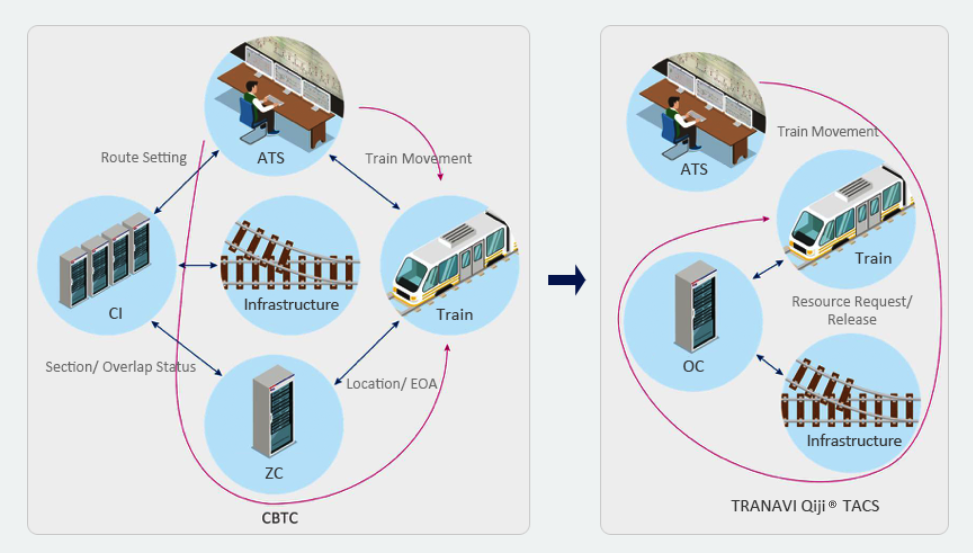



Train Autonomous Control System (TACS) is a signaling system that enables autonomous resource management and active interval protection based on operation plan and real-time location. TRANAVI Qiji® TACS system has realized autonomous resource management and active interval protection of trains, through three key innovations: platform optimization, system simplification and resource refinement. With simplified system structure and more user-friendly features, TRANAVI Qiji® provides safe and comprehensive protection during the whole process.

The safety response time is reduced by 30% compared with that of CBTC, so that it can respond to changes of internal and external conditions faster and guide to the safe side earlier.
The trains can directly and actively participate in the interlocking operation of resources, which changes the indirect and passive participation mode of trains in the past, and provides more comprehensive safety.
The key indicators in the operation of rail transit have been optimized, resulting in increased transportation capacity and efficiency.
With more refined resource management, the space-time utilization of resources is improved.
Shuttle between any stations: The trains can now shuttle quickly between any stations in any direction and respond flexibly to sudden changes in passenger flow.
Turn-back at any point: Based on the operation status ahead of the train, the dispatcher can adjust the operation task of the train at any time, to enforce immediate turn-back at any point, or two-way operation on a single-line, thus responding to various scenarios flexibly.
Accurate transportation capacity dispatching: Transportation capacity can be dispatched more efficiently according to the volume of passengers, to ensure that capacity matches demand.
Eco-friendly and low-carbon: The rapid coordination of train traction and braking enable optimal management of energy, which effectively reduces energy consumption.
With shorter turn-back rails and vehicle storage tracks, the length of station can be reduced by shortening train formation.
Reduced operation and maintenance cost: It cut the number of trackside centralized control equipment, lowered equipment maintenance cost and power consumption, and reduced the size of equipment room and cost of cable laying and maintenance.
Easy to transform: Transformation projects can be implemented with less trackside equipment, and be delivered in a shorter time.
Easy to extend: It is convenient to improve the efficiency of line extension with less influence from trackside equipment.
Easy to upgrade: With multi-core on-board equipment, it can satisfy the needs of customized system upgrade.

TRANAVI Qiji® adopts a multi-core high-performance safety platform, making the computing speed almost 20 times faster. Its processing mechanism can be customized according to different requirements, to meet the upgrade demand of different systems. It has faster real-time processing capability of key business, and more accurate velocity measuring and positioning.
The traditional CBTC system has more trackside centralized control equipment, complicated data transmission procedure and slow update of safety control information, which affects system operating efficiency. TRANAVI Qiji® simplified the trackside centralized control equipment, shortened the path of data transmission, achieved flat architecture of the system and improved the real-time performance of the system.
The traditional CBTC system is based on route, and its trackside resource management features large granularity, which affects the tracking intervals of trains. TRANAVI Qiji® can actively request trackside resources according to the train operation tasks, establish train-to-train communication directly, and process mobile authorizations on its own, which contributes to better utilization of trackside resources and higher train operation efficiency.
